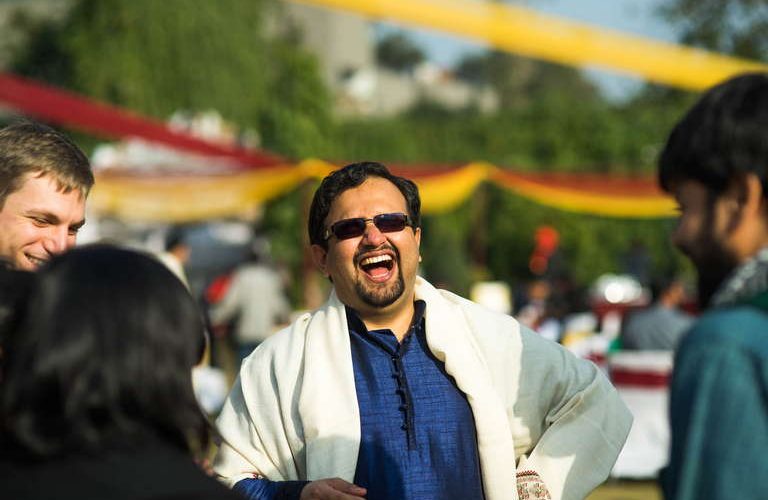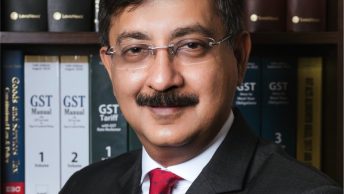Continuing our conversation with Alok Prasanna Kumar, Co-Founder of Vidhi Centre for Legal Policy and Research. An Alumnus of NALSAR University of Law and Oxford University, his research areas include judicial reforms, Constitutional law, urban development, and law and technology. He writes a monthly column for the Economic and Political Weekly, and has published papers in several leading journals such as the Indian Journal of Constitutional Law and National Law School of India Review, apart from media outlets such as The Hindu, Indian Express, Scroll, Quint and Caravan and currently also co-hosts the Ganatantra podcast on IVM Podcasts.

In this interview, we seek his opinions on the recent Supreme Court judgment in the case of Mohit Minerals vs. Union of India, and its implications not just on the GST Framework. but also the Fiscal Federal structure of our Constitution.
Q6. The judgment, Union of India versus Mohit Minerals, 2022 is quite voluminous, and tax is an area which most people find complex. Therefore, I request you to please demystify the Judgment? Why did this issue come up? And what is the brief history of the issue of the GST Council, its recommendations, and what exactly does this mean?
Let’s first start by understanding what GST is. GST is a transaction tax that means, when A buys something from B and A is giving B the money, A has to add an element of tax to it. B takes an element of tax and gives it to the government. What is being taxed is the transaction – the fact that there is a transfer of goods or services and there is aconsideration in response.
GST does away with the artificial distinction between goods and services. All of them will come under the same tax regime. States will tax and the Centre will tax. We have now moved to a system where instead of taxing goods and taxing services, we are imposing a transaction tax on a bunch of things.
The complication arises when goods and money go in different directions. For instance, sitting in Bangalore, I buy something from Delhi. I transfer the money online. It goes to the person selling me the product, and they ship it to me across the country. Now, this is where something called the IGST is levied because it has moved across borders, eventually to reach me. On an international level, there is a question of import which attracts customs duties. Customs is only something you apply on goods entering the country. There are currently no customs on services. But that is also a transaction, and can also be subject to GST.
Q7. Can you shed some light on the issue in the Mohit Minerals case?
The nub of the Mohit Minerals matter is that suppose you are importing large quantities of goods from overseas. You have to pay for those goods to get transported. Suppose I want to buy something from Turkey. It has to travel by sea. I will say, “I am paying you 100 crores for this,” I’m going to receive this in India but because I’m buying it for about a rate of 100 crores, why don’t you cover the transport cost yourself? My supplier would agree to it as it is not just a good gesture but also a practice to cover such transportation costs. This is pure import, and there is no question of GST arising here. But if the supplier reaches someone else in Cyprus to pick up the goods from Turkey and transport them to India. This is between two foreign parties.
In Mohit Minerals, what the government tried to do was levy IGST on the Indian receiver of goods for the transaction that had taken place between the guy in Turkey and the guy in Cyprus. Now the government is saying to me, “On the 100 crores of goods that you have purchased, I want you to pay an IGST by reverse charge.” The general rule is that the person who receives the money pays the tax but reverse charge changes it around to the person who pays the money also has to pay tax for being the ultimate beneficiary of the transaction. The Gujarat High Court struck it down saying that this gave extraterritorial application to the GST. You are effectively targeting and taxing a transaction between two parties outside this country. Since there is no relation to this country; therefore, you cannot tax it. The court looked at the GST law itself, which are the central goods and services tax, the state goods and services tax, and the integrated goods and services tax. And it said that there is nothing in this law which allows you to tax a transaction like this. This is a pure administrative law principle. The government had issued notifications saying that you will tax them accordingly. The Court looked at the definition of supply of service and said nothing in this law allows you to collect tax for such a transaction by issuing a notification. It is authored by Justice Pardiwala and it is good judgement which starts from the simple and goes to the complex.
The government used novel arguments in its appeal to this judgement. In the Supreme Court, it was argued that the GST Council is composed of states and the Centre which had decided that such transactions should be taxed and therefore, the Union government, bound by the GST Council’s recommendations, issued this notification. This meant to say that unless you are challenging or saying that the Council’s recommendations are unconstitutional or something, you cannot challenge the notification alone for being against the statute. The notification draws its authority from the recommendation of the GST Council. The Supreme Court responded by saying that the GST Council recommendations are not binding.
The Court looked at how the Council functions – the way voting happens. In the GST Council, both the states and the Union represented. Their decisions are supposed to be taken by majority vote, but it’s not one entity, one vote. The majority does not mean fifty per cent. Majority means seventy-five per cent. All the states put together account for two-thirds of the vote. The Union alone accounts for one-third of the vote. The states put together will not be able to pass a decision or a recommendation if the Union does not agree to it, but the Union and about half the states can agree to something and be considered binding or be considered passed.
According to Justice Chandrachud, this was going against the basic structure principle of Federalism, and there were two choices before him. He could have struck down the amendment which introduced GST, i.e., the 101st Constitutional Amendment introducing such a clause which will compel the state legislature to follow the directives of the body, or he could interpret it in such a manner as to make it non-binding and leave it to state legislatures and the Union to figure out how to implement it. He chose the latter option, which is why we have the Judgment of the Supreme Court in Mohit Minerals, which says that in the context of GST Council recommendations, they can only be non-binding recommendations. But if they so choose to, they can make appropriate amendments to make them binding, however it will not be presumed.

(Mr. Alok Prasanna Kumar has written for the NLSIR on this issue as well. The paper can be accessed here.)
Q8. Justice Chandrachud said that India follows the Cooperative model, and if the Union government could do whatever it wants to with just brute force, then this whole Cooperative model would break down. How would you respond to this in context of the GST Council controversy?
Let’s go back to the history of framing of the Indian Constitution. India’s model of Federalism is different from the U.S. and U.K. However, if we plot all of this on a spectrum, we would realize India lies closer to the U.S. than to the U.K. even though we have adopted a Westminster style of parliamentary democracy. This has come from years of interpretation of Indian federalism which is derived from a common Constitution. Cooperative federalism is a new concept altogether which evolved since after the ’80s when there was a whirlwind of political changes as well as constitutional jurisprudence.
When we come to GST, initial idea was that the Council would act as a coordinating body if we wanted similar tax rates across the country. The Council would take consensus-based decisions in the form of recommendations. At some point between the initial draft and the final bill that was passed, this consensus was replaced by majority voting. As per my research of locating this change, the first time it is mentioned is during the Rajya Sabha Select Committee Hearings in 2014-15 where Mr. Sushil Modi justified it as being easier. It is also mentioned in the final report of I think the Joint Parliamentary Committee which dissented with the mechanism and said that it should be consensus based. Eventually, the GST law was passed in the form that we know today.
Justice Chandrachud’s concern comes in Mohit Minerals when we make the GST Council recommendations binding. It would mean that another body is sitting on top of the state legislature but never on top of the Union legislature. From being at the same level, state legislatures are suddenly falling a little bit below. This goes against the very idea of federalism in India which accorded the state legislatures sovereignty over state subjects. Cooperative Federalism does not describe a constitutional mechanism. It is just a way in which states and Union Government works. But under our constitution, interpreting it this way would create a situation where the state legislatures and state governments would be bound by what this particular body said where they might not have agreed to it. They follow it because effectively, Union is telling them to do so.
But here is my counterargument. GST cannot work on good wishes or gentlemen’s handshakes, as they used to call them. It needs a legal framework where there is a certainty that when the GST Council agrees to do so, it will happen. It will not be left for the individual states to figure it out. Otherwise, it would cause conflict in interpretations and different states would want to go in different directions, leading to disputes. What makes or breaks GST is uniformity not just in rates, but also in interpretation of the transaction itself along with how it is levied and collected. However, this does not solve the real problem. If the GST Council’s recommendations are not binding, then there would be fundamental issues with the GST Amendment itself. The Mohit Minerals judgment is trying to put a Band-Aid and the Band-Aid will last for a while. I’m not saying tomorrow the whole thing will fall apart, and right now, it has not yet been subject to such serious stresses and strains that will test the strength of this bandage. When states run short of money, they will start taxing other things according to their revenue needs, saying that the GST Council recommendations are not binding. The other possibility would be that some states with unique industrial sector will be given exemptions, contradicting the structure of the GST and this is a fundamental problem. I do not think GST will have a long life with non-binding recommendations.
Q9. Just a couple of years ago at NALSAR, we hosted senior advocate Arvind P. Datar, and he told us that, in effect, there is a possibility of having 29 different GST regimes in the country, with each State being a GST regime of its own. How do you see the long-term future of the GST Council and the Fiscal Federalism in this context?
If thing do not change, I think what Mr. Datar feels or suggests might happen, maybe not with all the states. Because the economically bigger states which account for majority of the country’s finances, if they decide that this version of GST is not helping them, then the whole thing is gone. The Mohit Minerals judgment has shown us that now is the time to fix this fundamental problem with the GST Council. It can either be consensus-based recommendations, or majority based binding recommendations with the Union not imposing its will on the states. Personally, I feel it does Indian federalism more justice to have a consensus mechanism and, say, call it recommendations. You will not need a dispute resolution body. You will not need any way to conceal it or mediate because now the pressure is on the parties to negotiate because let’s not assume it is the Centre versus State. It will be state versus state. By and large, the so-called producer States and so-called consumer States who will have different interests, but they are not irreconcilable. You may have to say okay, fine, we will not do this for now but let’s see if the situation changes and we will do it later. That is part of the process of what makes GST work. Other countries, for instance, agree. Australia, for example, where states have a lot more power over taxation, they agree with the Union to say this is how we will tax. They consider it binding among themselves. So that way, this is what I think is an opportunity right now to fix this problem so that tomorrow when the stresses start to come forth, they can be absorbed by the system.
situs toto



